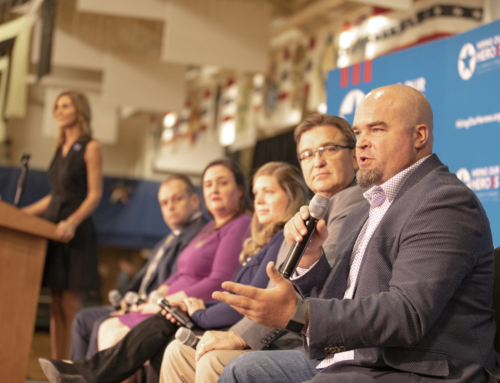It’s no secret that former service members make some of the best employees in the workforce.
Those transitioning out of the military possess qualities that every employer is looking for, including leadership; flexibility; adaptability; the ability to work as both a team leader and a team member; the aptitude to work under pressure and meet deadlines; the ability to follow directions in an appropriate manner; planning and organizational skills; a strong commitment to working safely; and so much more.
Given its long history of manufacturing leadership and continued innovation in fields that are driving global commerce, Wisconsin provides thousands of jobs that align well with military training, and many employers in the state give preference and incentives to veterans. Foxconn, for example, is creating up to 13,000 new jobs and is committed to hiring 3,000 veterans to help fill those positions.
While the basic and advanced training you’ve gone through during your military service has strengthened your skills, it can be challenging finding the right application for your talents in the civilian world. Wisconsin helps bridge this gap for transitioning veterans with resources that connect you with employers and jobs that reinforce the value you bring to the workplace.
Translate your military skills to a job you’ll love
Here are four things that can help you get the career you’ve always wanted in Wisconsin:
- Military rank means a lot to service members, but unfortunately sometimes civilians don’t understand the hard work and dedication it has taken to achieve this recognition. That’s why the Wisconsin Department of Workforce Development’s (DWD’s) Office of Veteran Employment Services provides veteran job seekers help with resume development. A big part of that process is turning a military rank into specific job titles. For example, a sergeant rank is comparable to being a supervisor in civilian life, with each knowing how to lead and manage a team. DWD has created teams within its Veteran Employment Services who act as case managers. They offer guidance on how to transfer skillsets into civilian terms. Learn more about some of the DWD’s offerings by clicking here.
- Another offering through DWD breaks down skillsets even further. Every occupation in the U.S. has a code attached to it, and each code comprises a set of skills associated with that job. The same is true in the military with a Military Occupational Specialty code, frequently referred to as an MOS code. WiscJobsForVets.com offers an easy-to-use option for you to enter your MOS code to see which of the more than 100,000 listed careers best apply to you and your expertise.
- Be sure to tailor your resume to the specific job you want. To catch the attention of employers—aside from listing the knowledge, skills and ability you learn in the military—change some of the verbiage in your resume to specifically match the description of the job you’re applying for. To help you communicate what makes your background and service time valuable, Wisconsin Veteran Employment Services staff members offer resume development assistance.
- Breaking out of the military mindset during interviews can be difficult, but it is necessary. Making a great first impression and interviewing well is the most important part of getting hired. Understandably so, many service members come out of the military with a distinct mindset and composition. Quick, concise answers to questions are normal to them because service members are taught that time is vital. However, some civilian employers have difficulty understanding that mindset. When in doubt, ask if your response provided enough context or share an example that is relevant from your military career. To further prepare for interviews, the Wisconsin Department of Labor’s Veterans’ Employment and Training Service program features veterans representatives that offer workshops and guidance on job interviewing skills.
For more information of the resources available for veterans seeking to maximize their career and personal success in Wisconsin, visit InWisconsin.com/veterans.












FOLLOW US